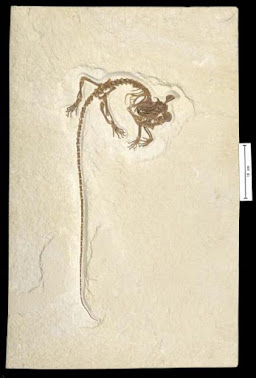A wonderful fossil from the Green River formation in Wyoming has been identified as a new species of bat,
Icaronycteris gunnelli. It dates to around 52 million years ago, making it the oldest bat fossil yet identified. This was a small animal, weighing less than an ounce (25 grams), roughly the size of a modern little brown bat.
The
Green River Formation is the remains of three huge lakes that once covered parts of Utah, Wyoming, and Colorado. They endured for around 12 million years, which is a long time for lakes, gradually accummulating sediment and preserving many wonderful fossils. The Green River formation spreads across around 65,000 square kilometers or 25,000 square miles and reaches 600 meters (2,000 feet) in thickness. Which is a lot of rock.
The remains of Fossil Lake have proved (no surprise) to be particularly rich in fossils; this slab shows two small fish, a snail, and a bird.
The formation looks like this; much of it is exposed in canyon walls along the Green River, hence the name.
The Field Museum has a
delightful slide show of specimens from Fossil Lake.
This small carnivorous mammal has the first known prehensille tail, and in fact its tail has more verterbrae than any other known species.
But to get back to bats! This one is from
wikipedia, found in 2021 and not yet identified.
Paleontologists are avidly pursuing ever older bat fossils because their evolution remains a
complete mystery. We have made much progress in recent decades understanding
other evolutionary puzzles, such as the evolution of whales, birds, and turtles. But so far there are no transitional fossils for bats. They just pop up in the record 50 million years ago, fully formed. By 50 mya they are also distributed around the world, with some fine fossils from India. So nobody knows where they arose, either. All we can say with certainty is that they were part of the great explosion of mammals that took place after the dinosaurs were wiped out 65 million years ago.
But it would be boring if we understood everything, right?













No comments:
Post a Comment